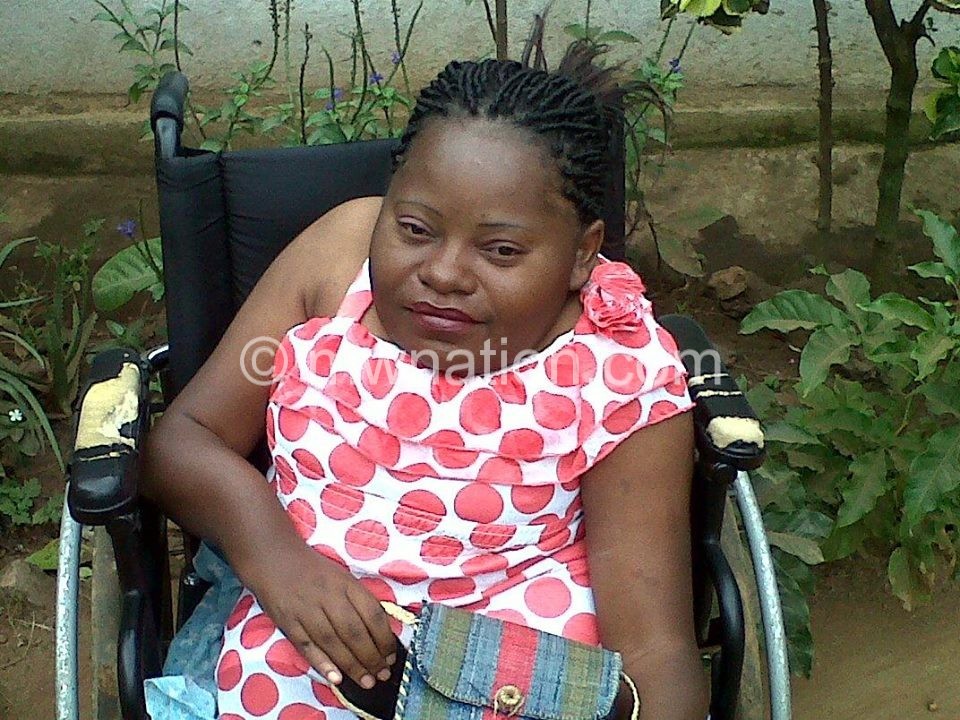Fatima Kalima: Co-founder of a youth disability forum
On November 19 1978, the Kalima family welcomed a new born and they named her Fatima, third born in the family at the time.
She grew up like any normal child, until when she was six she began to have broken bones in her hands and legs and then she could not walk any more.
“At some point I could not even do anything on my own, but then I was rehabilitated,” she recalls.
Kalima was home schooled by her father and her siblings as she was constantly in and out of hospital, until she got to Standard Five. She was then identified for education by Lilongwe Cheshire Homes, but had to go back to Standard Three.
She went to Chigoneka Primary School in Lilongwe up to Standard Eight, before going further to pursue her secondary studies at Chimutu Secondary School.
The young woman says her life as a person with disability was alright until she moved to Blantyre.
“It got hard for me. From Standard Five to eight and through my secondary school, my friends took me to school, and not my relatives. I had trouble befriending people and the saddest part was that most were not treating me my age. They started calling me aunt Fatima, when I was still young,” she explains.
These things coupled with the difficulty to go to school compelled her and her brother Rex (also living with disability), to establish a club which they christened Forum for the Development of Youths with Disabilities.
In 2011 it changed from being a club to an organisation. In 2012, it was registered as a non-governmental organisation (NGO).
Forum for the Development of Youths with Disabilities currently has membership of over 400 youths with different disabilities.
Among other things, the organisation’s focus areas include HIV and Aids, gender, human rights, sexual and reproductive health rights and education.
“The biggest gap we have seen in people with disabilities is education. Most of them do not get far with it. So, we offer after school classes for those that are enrolled in different schools and basic lessons in English, Chichewa and Mathematics for those whose parents do not send them to school, so that at least they become literate,” she says.
Forum for the Development of Youths with Disabilities has also come up with income generating activities for parents of the disabled children as an incentive for them to continue bringing the children to the centre.
“We have some livestock that the parents take care of and a farm where they cultivate crops. The proceeds from all these activities are shared among the parents. We do this as a way of encouraging them to keep bringing the children so that they get literate and learn from all the things we teach and get empowered,” says Kalima.
However, she says the lack of funding is a major challenge for the organisation which makes it hard to run some of the activities at the centre based at Namiyango Township in Blantyre.
“Apart from the funding we get from outside the country through the networks we have built, it would be nice to have local companies supporting us as well because the funding from outside is sometimes difficult to get.
“I have been to other countries and have seen that companies in those countries assist the organisations for people with disabilities. Unfortunately, that is not the case here. I have sent out proposals to different local companies, but none have come through to assist us,” she says.
The organisation is also represented in other areas in Blantyre, including Lirangwe, Chilaweni and Mpingwe.
Kalima says they visit those centres once every month.
Apart from that, it is the organisation’s wish to reach out to all the youths with disabilities across the country so that they get empowered.
Kalima says they always encourage the youth to show interest and participate in everything that is happening in their respective areas so as to aid in inclusiveness for the youths.
Her call is for the public to recognise people with disabilities as people that are capable of delivering just like any person.
“Being disabled was not an issue for me. I wrote to organisations and even went for job interviews, but because of my disability I was not picked. I have seen a lot of disabled people being segregated. There have been times I was refused to board a bus because of my disability and that is not fair. Segregation is a big problem in the country,” she points out.
The young woman advises younger people with disabilities that the only way to move forward in life is first to accept one’s disability and then work hard in school because school is everything.
The most important thing for her, she says, is to see parents of disabled children loving their children regardless of disability.
“We hold monthly meetings with the parents and guardians of children with disabilities, encouraging them to care for the children,” she says.
The 38-year-old is a Women Institute on Leadership and Disability (Wild) 2013 alumni. Wild brings together new and emerging women leaders with disabilities from around the world to strengthen leadership capacity, exchange experiences and strategies; create new visions and build international networks of support.
This year, 20 women from Uruguay, Armenia, Malawi, Kenya, Myanmar, Nigeria, Uganda, and Tanzania, among others, participated in the eighth Wild training programme.
It took place in Eugene, Oregon, USA between July 30 and August 21, 2016.
The training focused on access to reproductive health, gender-based violence prevention, implementation of policy and legislation and improvement of educational and employment opportunities for women with disabilities.





